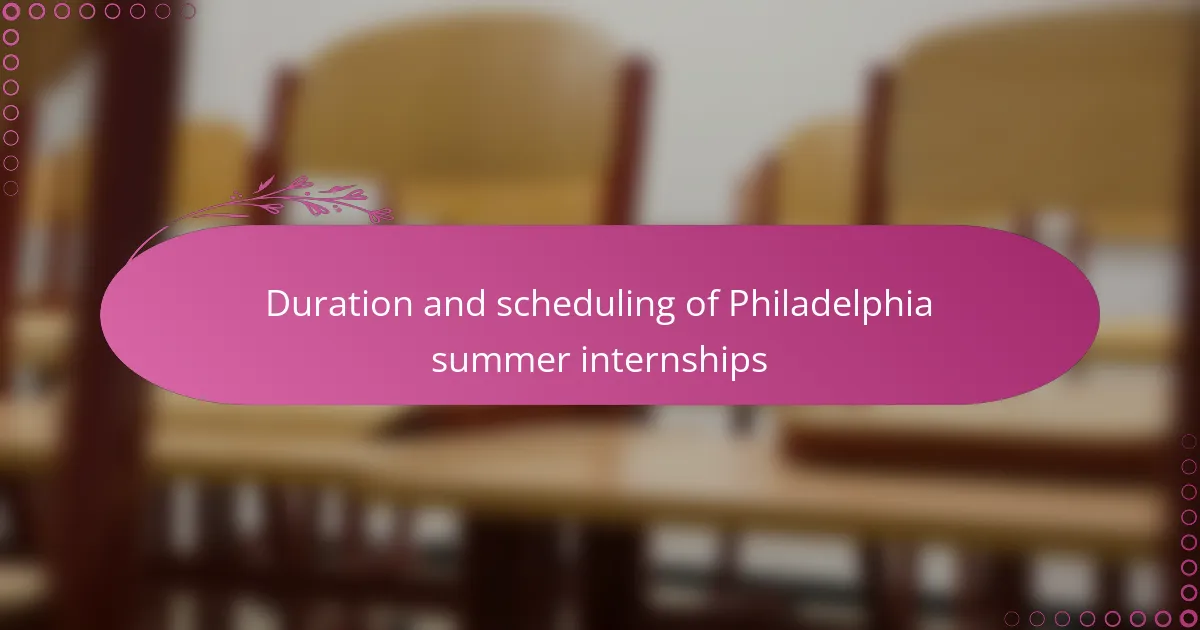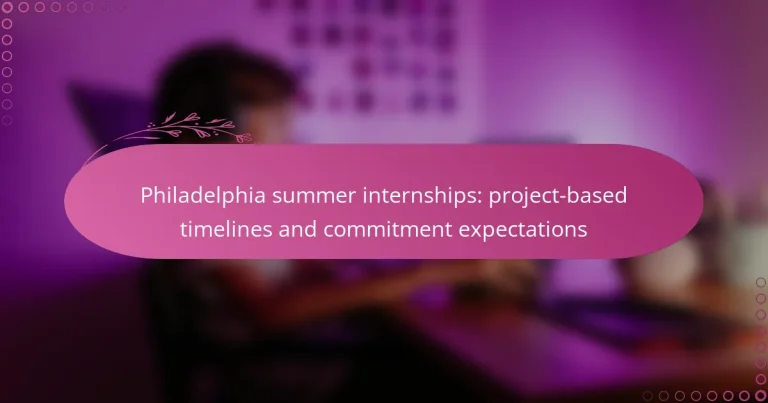

What are the key aspects of the duration and scheduling of Philadelphia summer internships?
Philadelphia summer internships typically last 8 to 12 weeks. They usually align with the academic summer break, beginning in late May or early June. Most internships follow a full-time schedule, averaging 30 to 40 hours per week. Some organizations offer flexible hours to accommodate student schedules. Internships may also vary in start dates, with some allowing staggered entry throughout the summer. Many programs require applications to be submitted several months in advance, often by March or April. This timeline ensures that students secure positions early. Companies often provide specific start and end dates in their internship postings.
How long do Philadelphia summer internships typically last?
Philadelphia summer internships typically last 10 to 12 weeks. This duration aligns with the standard summer break for many colleges and universities. Internships often begin in late May or early June and conclude in August. Many organizations design their internship programs to fit within this timeframe. This allows students to gain substantial experience while accommodating academic schedules. The specific length can vary by employer and industry. However, 10 to 12 weeks is a common benchmark in Philadelphia.
What factors influence the duration of summer internships in Philadelphia?
The duration of summer internships in Philadelphia is influenced by several key factors. Firstly, the type of organization offering the internship plays a significant role. Nonprofits may offer shorter internships compared to larger corporations. Secondly, the industry sector can affect duration. For example, tech companies may have longer internship programs to accommodate project timelines. Thirdly, academic requirements can dictate internship length. Many universities require internships to last a minimum number of weeks for credit. Additionally, the availability of funding can influence how long an internship lasts. Paid internships often have set durations based on budget constraints. Lastly, individual intern goals and commitments can also impact duration. Interns may seek flexible arrangements that align with personal schedules. These factors collectively shape the overall internship experience in Philadelphia.
How do internship durations compare across different industries in Philadelphia?
Internship durations in Philadelphia vary significantly by industry. Generally, internships in finance and technology last around 10 to 12 weeks. These sectors often require longer commitments for project completion. In contrast, internships in non-profits or education typically last between 8 to 10 weeks. These fields may offer more flexible schedules. The healthcare industry often presents internships lasting 12 weeks or more, reflecting the need for extensive training. According to a survey by the Philadelphia Internship Network, internship durations can range from 6 weeks to 16 weeks across various sectors, highlighting the diversity in commitments.
What is the typical schedule for summer internships in Philadelphia?
The typical schedule for summer internships in Philadelphia runs from late May to early August. Most internships last approximately 10 to 12 weeks. Interns generally work full-time, averaging 30 to 40 hours per week. Some organizations may offer part-time options, especially in academic or non-profit sectors. Many internships align with the academic calendar, starting after the spring semester concludes. Employers often expect interns to commit to the entire duration of the program. Flexibility in scheduling may vary by industry and organization. Internships in sectors like finance or technology typically follow this standard timeline.
What are common start and end dates for summer internships in Philadelphia?
Common start dates for summer internships in Philadelphia are typically late May to early June. Many internships align with the academic calendar, beginning shortly after the spring semester ends. End dates usually fall in late August to early September, coinciding with the start of the fall semester. This schedule allows interns to gain experience during the summer months while accommodating academic commitments. Many organizations post internships with these timelines to attract students.
How do scheduling practices vary among different organizations in Philadelphia?
Scheduling practices among different organizations in Philadelphia vary significantly. Some organizations utilize flexible scheduling, allowing interns to choose their hours. Others implement strict schedules with set start and end times. Nonprofits often offer part-time internships to accommodate students’ academic commitments. In contrast, corporate entities frequently require full-time availability during standard business hours. Additionally, some organizations provide remote work options, while others necessitate in-person attendance. This diversity reflects the varying needs and cultures of the organizations. For instance, a study by the Philadelphia Internship Network found that 60% of businesses offer flexible hours, while 40% maintain traditional schedules.
Why is scheduling important for both interns and employers?
Scheduling is important for both interns and employers to ensure efficient time management and productivity. It allows interns to allocate their time effectively between tasks and learning opportunities. For employers, scheduling helps in planning resources and managing workloads. It also facilitates clear communication regarding expectations and deadlines. Structured schedules can lead to improved performance and accountability. According to a study by the National Association of Colleges and Employers, effective scheduling increases internship satisfaction for both parties. This satisfaction can enhance the overall internship experience and lead to better outcomes for the organization.
How does effective scheduling impact the intern experience?
Effective scheduling significantly enhances the intern experience. It ensures that interns have a structured timeline for their tasks and responsibilities. This structure helps interns understand expectations clearly. It also allows for the allocation of time for learning and professional development. Research shows that organized schedules can increase productivity by up to 25%. Moreover, effective scheduling fosters better communication between interns and supervisors. This communication leads to timely feedback, which is crucial for growth. Interns who experience well-planned schedules report higher satisfaction levels. Overall, effective scheduling creates a more engaging and supportive internship environment.
What are the potential challenges of poor scheduling in internships?
Poor scheduling in internships can lead to several significant challenges. Interns may experience confusion regarding their responsibilities. This confusion can result in decreased productivity. Additionally, poor scheduling can cause interns to miss important training sessions. Missed training can hinder skill development and learning opportunities. Interns may also face conflicts with other commitments, such as classes or jobs. This can lead to increased stress and burnout. Furthermore, irregular scheduling can disrupt team dynamics and collaboration. When interns are not present consistently, it can affect project continuity. Ultimately, these challenges can diminish the overall internship experience for both interns and employers.
How can students find and apply for summer internships in Philadelphia?
Students can find and apply for summer internships in Philadelphia through various methods. They can utilize online job platforms like LinkedIn, Indeed, and Glassdoor. University career services often provide resources and listings for internships. Networking events and career fairs in Philadelphia are valuable for connecting with employers. Additionally, students can reach out directly to companies of interest. Many organizations post internship opportunities on their websites. Social media platforms can also be useful for discovering internships. According to the National Association of Colleges and Employers, 60% of internships are found through networking. This highlights the importance of building professional connections.
What resources are available for locating summer internships in Philadelphia?
Key resources for locating summer internships in Philadelphia include online job boards and university career centers. Websites like Indeed, Glassdoor, and LinkedIn frequently list internship opportunities. Local organizations such as the Greater Philadelphia Chamber of Commerce also provide internship listings. Networking events and career fairs in Philadelphia can connect students with potential employers. Additionally, internships.com is a specialized platform focusing on internships. Utilizing social media platforms like Facebook and Twitter can also yield internship leads. The Philadelphia Workforce Development Board offers resources and support for job seekers.
What are best practices for applying to summer internships in Philadelphia?
Research the companies you want to intern with in Philadelphia. Understand their values, culture, and internship programs. Tailor your resume and cover letter for each application. Highlight relevant skills and experiences that align with the internship requirements. Network with professionals in your field through platforms like LinkedIn. Attend career fairs and local networking events in Philadelphia. Follow up on your applications to express continued interest. Keep track of deadlines and apply early, as many internships fill quickly.
What tips can help interns manage their time effectively during the internship?
Interns can manage their time effectively by prioritizing tasks. They should create a daily to-do list. This list helps in identifying urgent and important tasks. Setting specific deadlines for each task is crucial. Interns should also allocate time blocks for focused work. This technique minimizes distractions and increases productivity. Regular breaks are important to maintain energy levels. Utilizing digital tools for scheduling can enhance organization. Lastly, seeking feedback from supervisors can improve time management skills.
The main entity of this article is the duration and scheduling of summer internships in Philadelphia. Philadelphia summer internships typically last between 8 to 12 weeks, aligning with the academic summer break and generally requiring full-time commitment of 30 to 40 hours per week. The article explores key aspects influencing internship duration, including organizational type, industry sector, and academic requirements, while also detailing common scheduling practices, application methods, and resources available for students seeking internships. Additionally, it highlights the importance of effective scheduling for both interns and employers, addressing potential challenges and providing tips for successful time management during the internship experience.






